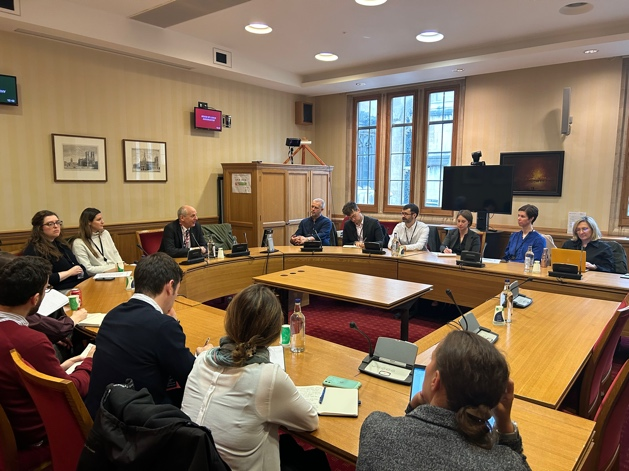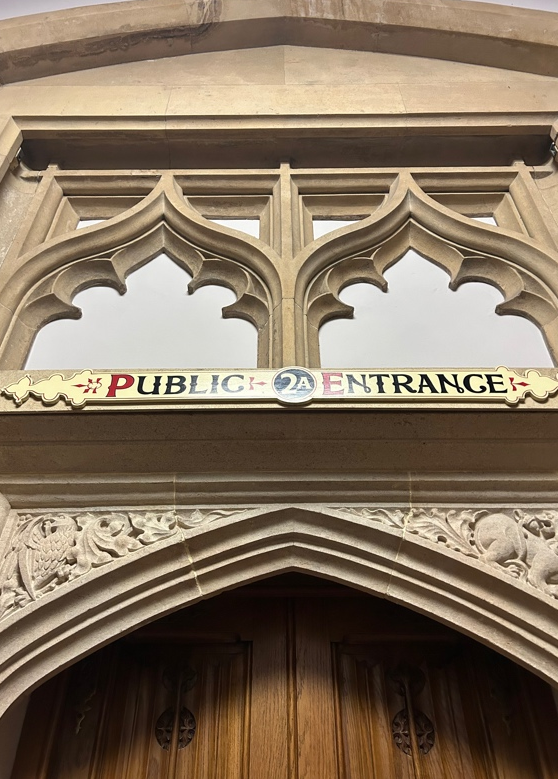On November 16, 2023, a group of around 10 UoS academics from a range of disciplines and knowledge brokers embarked on a visit to the Houses of Parliament. We were invited to a meeting with Lord Redesdale at the House of Lords to learn more about the role of peers and how best to engage with them in the policymaking process.
Lord Redesdale shared insider knowledge about the end-to-end policymaking process in the UK and how members of the House of Lords provide input at different stages. We learned about the variety of roles of the Lords in developing legislation, such as raising private members bills for debate, getting involved with APPGs, or carrying out inquiries. Peers are involved with Lords or Joint Select Committees according to their interests, and via this platform, they can conduct inquiries around topics of national or international interest. Inquiries involve gathering evidence from various stakeholders, including from members of the public, practitioners, industry partners, government departments or agencies, charities, and academics. Inquiries offer an opportunity for the Upper House to hear from leading experts in their field to better understand a topic and develop a report and recommendations for the government based on this expert testimony.
The group was then introduced to Committee staff, who provide secretariat support to inquiries in the House of Lords. They explained the challenging process of how they collate and summarise the often vast quantities of information provided to an inquiry before sharing it with the committee. We explored ‘what good looks like’ in terms of the submissions made by academics to inquiries and how academic evidence can be used to effectively support policy scrutiny. The plea from the Committee specialists to remember that there is a person on the other side of the inquiry who needs to read and process these was heard loud and clear!
We were also lucky to be introduced to Marc D’Arcy, a parliamentary commentator with the BBC and former host for 20 years of the Westminster Hour (essential Sunday evening listening for politics geeks everywhere!). He explained how interactions with the press can complement parliamentary engagement for academics seeking policy impact. Marc said that in a world of never-ending emails, academics should not underestimate the power of picking up the phone and speaking directly with a journalist. He also assured us that lunches are still popular modes of knowledge transfer with members of the press as well. For evergreen issues, he suggested getting in touch with lobby journalists when Parliament isn’t sitting, as things can be a bit quieter and journalists can be easier to get a hold of.
Lord Redesdale concluded the meeting by sharing some of his top tips for how to engage and build working relationships within Parliament. He stressed the importance of engaging early, before the issue becomes political, and told us to address people by their first name in an email: “I’ll be much more likely to read an email that begins, ‘Dear Rupert’ “. He then implored us to connect with Lords who share a similar research interest in order to “get through the noise." One can find relevant Lords by searching through Select Committees or Hansard, for example. He also emphasised the importance of communicating in clear, jargon-free language and being able to clearly demonstrate the importance or value of research to a specific group as a way of sparking an interest.
Professor Andy Cruden, who attended the meeting on behalf of the FEVER project, said, "The key message I took away was to follow the KISS principle (Keep It Simple, Stupid!). You are effectively giving an 'elevator pitch' to attract parliamentarians' attention amongst the many competing interests and active campaigns at Westminster. You should simultaneously try to develop and cultivate a longer-term relationship with both Westminster officials and related national and technical press to maintain interest and reputation in your field."
We were treated to a tour of the Palace of Westminster and the Lords Chamber, allowing us to try and put ourselves in the shoes of a peer. The visit was a helpful reminder that all those involved in the policymaking process, including Lords, are humans, and we should seek to interact with them in the ways we would choose to be contacted. In other words, appealing to our human nature, limited time, and tendency to focus on the most urgent and compelling topics.

